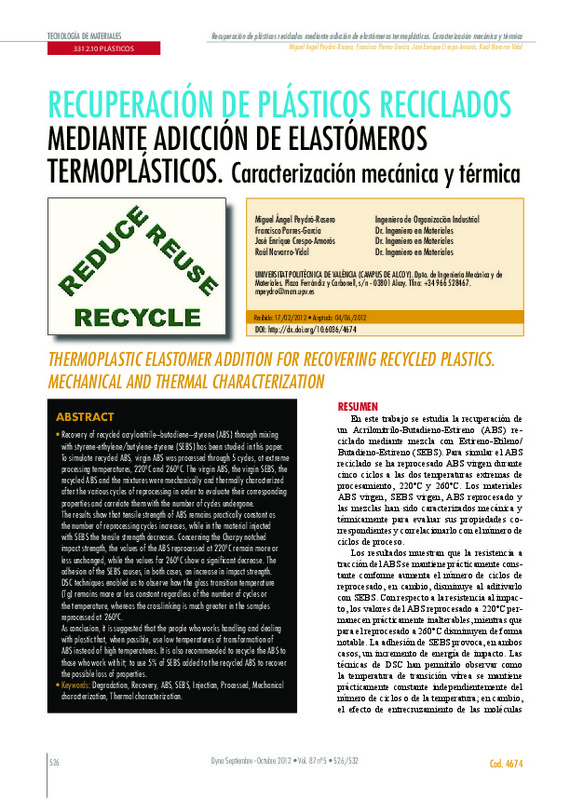|
Resumen:
|
[EN] Recovery of recycled acrylonitrile butadiene styrene (ABS) through mixing with styrene-ethylene/butylene-styrene (SEBS) has been studied in this paper. To simulate recycled ABS, virgin ABS was processed through 5 ...[+]
[EN] Recovery of recycled acrylonitrile butadiene styrene (ABS) through mixing with styrene-ethylene/butylene-styrene (SEBS) has been studied in this paper. To simulate recycled ABS, virgin ABS was processed through 5 cycles, at extreme processing temperatures, 220 degrees C and 260 degrees C. The virgin ABS, the virgin SEBS, the recycled ABS and the mixtures were mechanically and thermally characterized after the various cycles of reprocessing in order to evaluate their corresponding properties and correlate them with the number of cycles undergone. The results show that tensile strength of ABS remains practically constant as the number of reprocessing cycles increases, while in the material injected with SEBS the tensile strength decreases. Concerning the Charpy notched impact strength, the values of the ABS reprocessed at 220 degrees C remain more or less unchanged, while the values for 260 degrees C show a significant decrease. The adhesion of the SEBS causes, in both cases, an increase in impact strength. DSC techniques enabled us to observe how the glass transition temperature (Tg) remains more or less constant regardless of the number of cycles or the temperature, whereas the crosslinking is much greater in the samples reprocessed at 260 degrees C. As conclusion, it is suggested that the people who works handling and dealing with plastic that, when possible, use low temperatures of transformation of ABS instead of high temperatures. It is also recommended to recycle the ABS to those who work with it; to use 5% of SEBS added to the recycled ABS to recover the possible loss of properties.
[-]
[ES] En este trabajo se estudia la recuperación de un Acrilonitrilo-Butadieno-Estireno (ABS) reciclado mediante mezcla con Estireno-Etileno/ Butadieno-Estireno (SEBS). Para simular el ABS reciclado se ha reprocesado ABS ...[+]
[ES] En este trabajo se estudia la recuperación de un Acrilonitrilo-Butadieno-Estireno (ABS) reciclado mediante mezcla con Estireno-Etileno/ Butadieno-Estireno (SEBS). Para simular el ABS reciclado se ha reprocesado ABS virgen durante cinco ciclos a las dos temperaturas extremas de procesamiento, 220ºC y 260ºC. Los materiales ABS virgen, SEBS virgen, ABS reprocesado y las mezclas han sido caracterizados mecánica y térmicamente para evaluar sus propiedades correspondientes y correlacionarlo con el número de ciclos de proceso. Los resultados muestran que la resistencia a tracción del ABS se mantiene prácticamente constante conforme aumenta el número de ciclos de reprocesado, en cambio, disminuye al aditivarlo con SEBS. Con respecto a la resistencia al impacto, los valores del ABS reprocesado a 220ºC permanecen prácticamente inalterables, mientras que para el reprocesado a 260ºC disminuyen de forma notable. La adhesión de SEBS provoca, en ambos casos, un incremento de energía de impacto. Las técnicas de DSC han permitido observar como la temperatura de transición vítrea se mantiene prácticamente constante independientemente del número de ciclos o de la temperatura; en cambio, el efecto de entrecruzamiento de las moléculas (crosslinking) es mucho mayor para las muestra reprocesadas a 260ºC. Como conclusión, se recomienda a los transformadores de plástico que, en lo posible, utilicen temperaturas de transformación del ABS bajas en vez de altas. También se recomienda a los transformadores que recuperen ABS, que utilicen un 5% de SEBS para mejorar las propiedades.
[-]
|
|
Agradecimientos:
|
Nos gustaría agradecer a la Subdirección de Investigación, Desarrollo e Innovación de la Universitat Politècnica de Valencia la ayuda concedida al proyecto: “la investigación de sistemas ternarios aplicados a los materiales ...[+]
Nos gustaría agradecer a la Subdirección de Investigación, Desarrollo e Innovación de la Universitat Politècnica de Valencia la ayuda concedida al proyecto: “la investigación de sistemas ternarios aplicados a los materiales poliméricos para la mejora de residuos de estireno”, Ref.: 20091056 en el programa de los primeros proyectos de investigación (PAID 06-09), donde este trabajo es un fragmento.
[-]
|









